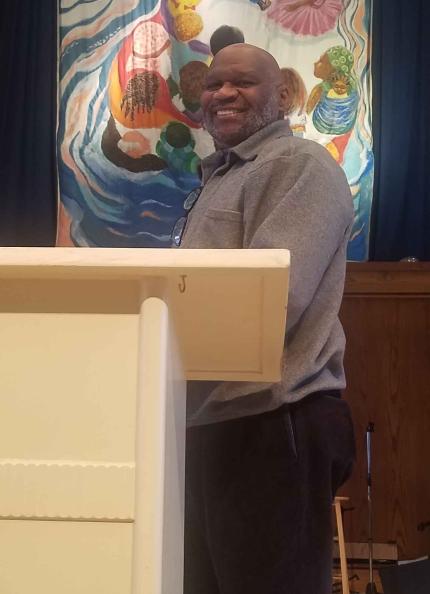Emmett Harrison: Learning to Love

Chris Meehan
As he prepared to take part in a service marking his retirement from Oakdale Park Christian Reformed Church, Grand Rapids, Mich., Rev. Emmett Harrison said he had been thinking of Philippians 1:3-6, in which Paul offers thanksgiving for all of the people he has had the opportunity to serve.
Especially on Harrison’s mind were these words: “In all my prayers for all of you, I always pray with joy because of your partnership in the gospel from the first day until now, being confident of this, that he who began a good work in you will carry it on to completion until the day of Christ Jesus.”
Some 40 years of pastoral ministry in various settings, Harrison said, has brought many blessings and joy — such as that highlighted in Philippians — as well as challenges. And as he moves into the next phase of his life and ministry, he said, he has been reflecting on how he has seen doors open to allow persons of color such as himself to take leadership roles in the CRC.
“The CRC has come a long way. We have seen a movement of people taking on important positions,” said Harrison, whose retirement service was held Sunday, Nov. 24, at the church in southeast Grand Rapids where he has served for the past seven years.
Echoing Paul’s words about the Lord being there to bring a good work to completion, he added: “It is crucial, especially in this [political] climate in which we find ourselves, for this movement of racial inclusion to grow deeper and broader. It is not over.”
Colin Watson, director of ministries and administration for the CRCNA and one of those leaders to whom Harrison pointed, also spoke during the service on Sunday. He mentioned that Harrison is one who encouraged him to take the position he has held since 2015.
Among other things, Watson spoke of Harrison as being a pastor and “real gentleman” who is “not easily rattled. . . . He is a great representative of how we can work together across racial lines, across class lines, and across geographic lines.”
Having grown up in Mississippi, in the U.S. South, during an era of segregation and violence, Harrison could have had reasons to be angry and not to love. But, said Watson, Harrison possesses a Martin Luther King., Jr., kind of love.
“As King said, and [as reflected in] one of his sermon collections, ‘It takes strength to love.’ Pastor Emmett has that strength, that ‘in spite of’ kind of love,” said Watson.
Harrison recalls living as a young child in the Jim Crow South, a place in which black people were more than marginalized; they were beaten and oppressed and sometimes lynched for no reason other than the color of their skin.
“My mother took me and my sister north from Meridian [Miss.] to Chicago right in the throes of the civil rights movement,” said Harrison. “My mother’s sister was part of the freedom riders. It was a dangerous time.”
Freedom riders were civil-rights activists who rode buses into places in the South to make sure that people were following a U.S. Supreme Court ruling that opened interstate transportation to black persons.
Arriving from the sleepy, slow-paced town in which they had lived, to the fast-paced streets of Chicago was a culture shock for Harrison, he said. At first, all of the activity made the young man’s head swim. But the breadth and density of the population offered him a chance to view and experience a much wider world.
Once there, he attended elementary school and a newly integrated Chicago high school. As he got older, social justice was very much on Harrison’s radar.
But his life went into a talspin, he said, after the assassination of Martin Luther King, Jr., on April 4, 1968, in Memphis, Tenn., where King had come to show support for striking sanitation workers.
“I wondered how we could search for justice for people of color in this nation if they could kill the drum major of peace,” said Harrison. An active churchgoer, he began to sense that the Christian church didn’t have the answers to the race problem in the U.S.
He turned at that point to the Black Panther party in Chicago for answers and inspiration. “The crucible for me came in seeing how they provided tutoring and hot lunches for young people. They also advocated for folks trapped in deplorable housing,” said Harrison. “They sought change by agitating the powers that be.”
But he turned from the Black Panther party after two of its leaders were killed in a police raid on Chicago’s west side in 1969. “I realized that we could not win our freedom through an armed struggle with the U.S.,” Harrison said.
From there, Harrison encountered a time of searching for answers; it was a tough time, he said, that eventually brought him to a Baptist church, where he later became a minister.
“The pastor there was like a mystic, and he saw, just like my grandmother, that God wanted me for ministry,” said Harrison.
After meeting and marrying his wife, Emily, Harrison moved to the Roseland neighborhood of Chicago. And to make ends meet while serving as a pastor, he started selling insurance.
One day in the 1980s, he said, he passed by the large Roseland Ministry Center of the Christian Reformed Church. The building, which had once been home to Back to God Ministries International, intrigued him by its size and the different types of people moving in and out of its doors. He decided to drop in to see if he could sell them an insurance policy.
Once inside, he learned that the place was busy with various kinds of ministry. He was directed to meet with Tony Van Zanten, the director, about the matter of insurance.
“I made an appointment to see him. When we met, I introduced myself and got right down to business,” said Harrison. “Tony listened to all that I had to say. When I finished, he told me that they were self-insured.”
But the meeting didn’t end there. Van Zanten filled him in on Roseland’s ministry and its vision. “He shared the dream of why God sent him to the area from which so many other CRC churches had fled.”
Van Zanten told Harrison he was there to raise up leaders who were from the area. By that time Harrison had developed a leaning toward full-time ministry, he said, but he had not met a mentor, someone who could help form him into a pastor who served the city.
“Selling insurance was killing me. I needed a change, and I sensed that Tony could help expand my horizons and take me to places that I’d never been,” he said, adding that he jumped right in to learn from Van Zanten.
“He taught me about the Reformed faith. He became my friend and mentor. He showed me how to love the people in the city.”
While engaged at Roseland, Harrison took courses at Calvin Seminary and ended up serving in various capacities, including networking to help former President Barack Obama, then a community organizer, make connections with religious leaders in the Roseland area.
After five years, Harrison answered the call to serve at a CRC congregation in Cleveland, Ohio. He pastored there for more than 20 years. “I came to [the East Side CRC in] Warrensville Heights, which had been a largely white neighborhood that was transitioning into a black community.”
While working to help the church address the new realities it faced, Harrison also got more deeply involved in serving the denomination. In 2004 he became the first person of color to serve as a vice president of synod.
Harrison also took up positions on various boards, including the CRCNA Board of Trustees (now the Council of Delegates), and helped in different capacities to open the church to become more racially inclusive.
In 2012, Oakdale Park CRC, long an active presence in its neighborhood, called Harrison to be their senior pastor. Once there, he found ways to help expand its ministry in the city. One of those ways has been to partner with more than 200 refugees from Rwanda, the Democratic Republic of the Congo, Uganda, and Burundi who have joined Oakdale in its ministry. This work has included traveling to meet and plan with leaders of churches in Africa.
“Right now that is a work in progress,” he said. “I hope the relationship can become even tighter and more formal as time goes on.”
Looking at retirement, Harrison isn’t sure what will come next, but he knows there is still much to do. “I don’t sense God is saying that I’m done preaching,” he said. “I see myself mentoring people and perhaps doing some teaching.”
Looking back on a stimulating career in ministry, forged in part from his own experiences of living a hard existence in the city and from learning to appreciate God’s love and share it with others, Harrison noted that the chapters of his life have even taken him to places around the world such as Africa and Europe. “I’ve been on some big stages and have tried to help strengthen the church in a global way,” he said.
Thinking of those verses in Philippians, said Harrison, his hope is that he has been able to do some good work, especially in the area of race relations, and that that work will continue to ripple outward, making the CRC a place that will keep opening itself to a diversity of people and voices and will help carry it to completion “until the day of Christ Jesus” (Phil. 1:6).
